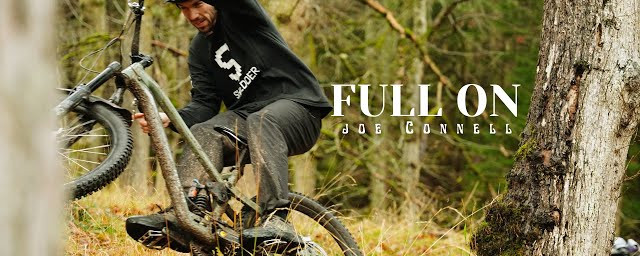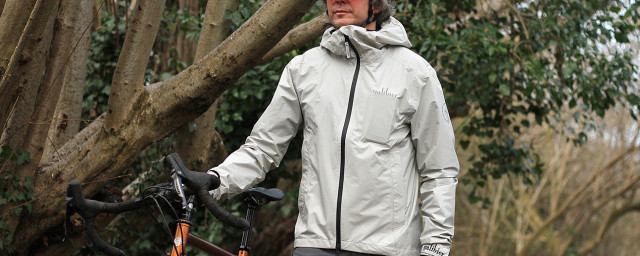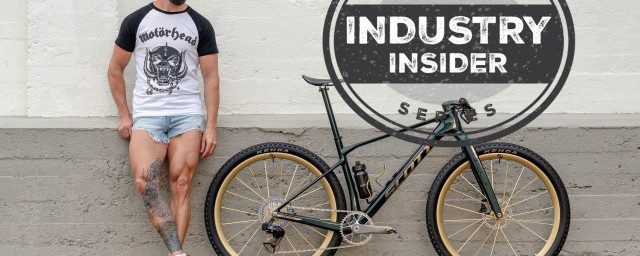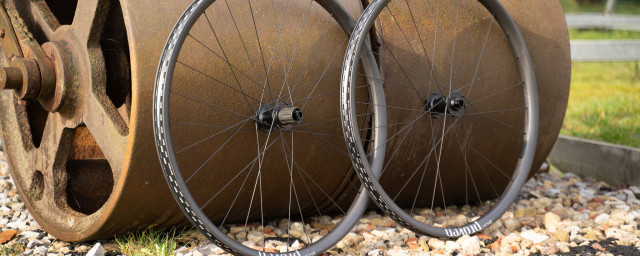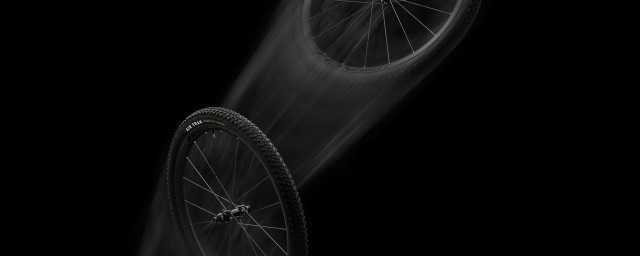Industry Insider: MTB career insights with Sarah Leishman

Sarah Leisman is a force to be reckoned with and her past includes time as a professional racer, communications leader and social media specialist. She began working at SRAM in 2020 following a few years at the Juliana|SRAM Pro team racing the Enduro World Series. She has also worked as the Senior Manager of Brand and Communications at Arc’teryx.
- Industry Insider: MTB career insights with Katy Curd
- The first-ever female riders compete in Red Bull Hardline finals
- Women's bike vs unisex bike
She's currently transitioning from head of Global Communications at SRAM to taking on the role of GM for Velocio, a cycling apparel brand committed to innovation and sustainability, which was acquired by SRAM back in 2022.
[Image courtesy of Margus Riga]
In your own words, who are you and what do you do?
Hi! I’m Sarah Leishman and I live in Squamish, BC. I was raised in a big ski-racing family in Alberta, Canada, and I have chased my career in and out of the mountains my whole life. I’ve coached competitive snowboarding, I’ve ski patrolled in Whistler and I raced the EWS on the first-ever all-women’s pro team. Riding bikes is my favourite thing to do and I love where I live (with my husband and our two dogs, Gord and Alice).
What is your job?
Until recently I took care of Global Communications at SRAM, which encompasses our global events team, our global ambassador (non-racing) sponsorship program, our community connection programming and our PR efforts around the world (for both road and mountain bike). The team supports all of SRAM’s brands and categories across Road and MTB, RockShox, Zipp, Velocio, Time and Hammerhead. I worked with a big team of professionals who are really good at what they do.
I’m now running our apparel brand, Velocio as the General Manager. I’m very excited about this as the brand is agile, very considered and cool; apparel has always been close to my heart!
How did you get into what you do?
Competition and outdoor sports have always been foundational to me. My family was always at the little local ski hill after school, so I naturally became a snowboard coach as I finished school (which was around the time I picked up mountain biking as a tool to train for winter sports). I coached at some of the biggest events in the world (World Championships in Korea was one) over my short career. Ultimately I realised I just wasn’t ready to spend my life as a bystander in other peoples’ dreams.
A lot of the athletes I worked with were around my age or older than I was back then, and I wanted to prove myself so I could chase a career change into cycling – riding bikes was always something I gravitated to and I had more fun doing it than skiing or snowboarding. I left my full-time job as a coach and moved to Whistler, and the rest sort of fell into place (with a lot of hard work and mistakes along the way). Initially, I knew no one in Whistler or cycling but I knew I had to earn credibility in the sport, so I got into racing locally as soon as I got to town. Racing introduced me to the local riding community, which happens to be very connected to the broader cycling industry, and I made some of the most lasting friendships of my life. After a few years of full-time ski (and bike park) patrolling, I got a 'real job' at Whistler Blackcomb in PR/social media that touched the Crankworx events.
I got super lucky after that and was contracted for work with the marketing team at Arc’teryx at almost the same time I signed with the Juliana | SRAM Pro Team, so I was able to race and pay my bills while I travelled the world for a couple of years. I landed my job at SRAM after a handful of years at Arc’teryx and I now work with a lot of the folks I’ve met along the way.
[Image courtesy of Dan Barham]
How long have you been working in the bike industry?
I’ve been at SRAM since 2020 but was racing/writing/doing bike stuff long before that. You could say I entered the ‘industry’ when I moved to Whistler and got a job at a bike shop (Fanatyk Co in Whistler) in 2009.
How have things changed since you started?
So much has changed! When I got my first PR gig in the industry, the work was still super traditional: you could send a press release to a stranger over email, and it could end up in print and be picked up by a person who could buy that magazine/newspaper on an actual newsstand. The landscape for media has changed so much – even digital media properties are being squeezed as social media has become so prolific.
Another big shift has been that the gender gap in our sport is shrinking, slowly and steadily, which is promising. Back when I was signed to my ‘big’ (to me) race team, the idea of an all-women’s team was crazy: the discipline we were in was pretty new, and it didn’t seem like enough women were racing at the time to justify the investment in a team only for women. The industry has since evolved from those days, and we’re seeing (slightly) stronger commitments to the inclusion of BIPOC and LGBTQ+ riders in programming and rosters (not just women). Brands are more willing to challenge the status quo beyond what has been such a white male-dominated sport. While I totally acknowledge that the road ahead for true fairness in representation remains long, I see steps being made that are important for the future success of our industry and the longevity of our sport.
Is there anything you wish you could change about your role/job?
I’m very fortunate. SRAM is a product-focused organisation and my team is involved in so many important innovations at a high level that it’s hard to want to change the mechanics of my job. Planning how we bring our very technical products to market is a complex process, and we are always imagining better ways to work together. I get excited when I think of members of my team taking my place one day (when I move on to whatever), and I’m grateful for the opportunity to collaborate with so many brilliant folks inside and outside of our business.
[Image courtesy of Alex Rafferty]
What does the average week look like?
Obviously, this has recently changed, and I’m still getting settled into my new role but, as communications manager, the average week changed depending on the time of year. If we’re talking Crankworx and SBT GRVLseason, there wasn’t a lot of downtime, I’d be outside with my team at events we support. Sometimes I got to attend our launch activities for new products, which are always fun: our media partners are great people and the team is dialed when it comes to hosting.
Events and launches were real highlights in the year for me as they were also the times that I got to be on my bike with other riders who love our sport. In the off-season, I typically spent a lot of time in front of screens – SRAM is a global company and my team is spread around the world, so my days typically started at 6am. The upside was that I’d often be done in time to get out and ride my bike, which is a huge perk for someone who lives where I do.
What advice would you give to someone who wants to do your job/what you do?
My path to my role today has been a bit wild but it buffed out. There are no rules to how you enter the industry, whether you’re transitioning from being an athlete to a professional with a ‘real job,’ or if you’re hoping to enter cycling from another industry or from school.
Having integrity, being honest and pulling one’s weight with work ethic and authenticity counts for a lot in this space, as it does in life. People who want to be in this industry are most successful when they imagine the benefit they can offer a company to help solve a problem or enhance a rider’s (end-user) experience. If you’re looking for a way in, get involved with your local riding community! Meet people, ride with them, volunteer at an event: anyone who has been in the sport for a while will probably agree that the riding community is what keeps us all around for so many years.
What do you like most about what you do?
I love connecting people and solving complex problems with the talented teams around me. Seeing a project come to life or creating a process that makes it easier to get something done makes coming to work every day worthwhile. My favourite thing is to give my team tools to help produce work they’re proud of – and it’s even better when they imagine improving those tools to make their work even more effective and memorable.
If you weren’t doing this, you would be...
I’d probably still be in the outdoor industry, which I also really love. There’s so much exciting work happening/to be done in apparel around sustainability and in reaching wider audiences. Working with skiers, climbers and alpinists at my old job was really special – cyclists and outdoor athletes are cut from the same gritty, hardworking (and kind of insane) cloth.
[Image courtesy of Sven Martin]
What have been some of the highlights of your career?
Mine are probably a weird mix. The superphysical (and often emotional) demands of ski patrolling, combined with the job’s requirement of working in close quarters in an often intense team environment, gave me a healthy gauge of what hard work under pressure actually feels like. Racing EWS events was another notable part of my background, and even though I was never very good at it, the perspective racing the events around the world gave me of our sport was invaluable
Learning the marketing process at Arc’teryx made me a better leader and team member at SRAM. I don’t have a specific moment that’s like “Did you know I did X?” because being a good leader is really about the full picture of qualities you bring to a team or business. Any time I’ve helped elevate someone else into a bigger role or helped them move a meaningful project along is something I’d call a major highlight. A good example of that is how my team delivered the launch of SRAM Transmission last March, which I consider quite successful.
The industry is in a bit of a tough situation in terms of the cost of living. Do you see it recovering any time soon and, if so, what will brands need to do to stay relevant and afloat?
I think there’s light on the horizon. The supply chain challenges swung the other way for most businesses over the past year or so, which is what we’re seeing in the market today. In some cases, the strain of excess inventory has been amplified for a lot of brands because of really unfortunate circumstances they just couldn’t control during and after the pandemic, which has been heartbreaking for a lot of brands and riders.
That said, the industry will weather this storm. We all see it on our local trails: more people are out riding than we’ve ever seen before because riding bikes is awesome! When new technologies are released that benefit a rider’s experience, people will adjust their spending based on what they want to update on their bike(s) and what they see value in. It’s going to be ok, and I think the greater community and industry will have learned from this period in time. We owe it to riders to keep evolving to continue to stay relevant.
[Image courtesy of Dan Barham]
What do you dislike most about the cycling industry?
We still have a long way to go to achieve gender and racial parity in our industry. Sometimes the disparity feels really egregious in cycling – and sometimes I see hope, as I said above – but it’s the one thing I’d really like to see change in a meaningful way. That means gender and racially-balanced leadership teams at brands, and balanced leadership teams at the governing body(ies) of our sport.
I think too many decisions are made at the qualitative level in cycling – I look forward to a future when balanced groups of people consider widespread needs before making decisions that impact folks who have experiences that look different from our own.
How do you keep things balanced when your hobby becomes your job?
I still like to ski, even though I don’t get to do it as much as I used to. Having a couple of dogs is a great way to force a person outside every day regardless of whether or not I want to be out there. Spending time outside in the forest every day has a massive impact on my well-being, so I try to make it happen whether I’m riding or not.
When it’s not raining and I’m not freezing my ass off, riding feels like a luxury. Years of training for racing taught me that I don’t HAVE to ride my bike – I do it because I have the choice to ride whenever I want! Riding is an incredible privilege that I’ve taken for granted in the past –life is way too short to not take advantage of the freedom we have to be outside whenever it suits us.





